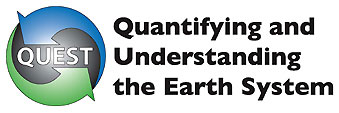 Introduction
Introduction

|
|
QUEST file uploader |
QUEST Archive |
||
 Introduction
Introduction
Society needs to plan for unavoidable changes, and to assess what different policies might achieve. A step-change improvement in our ability to understand environmental changes, as part of the complex interactions between the Earth system and human action, is needed to inform decision-making by businesses, organisations and governments at all levels, from local planning to international negotiations.
The Natural Environment Research Council (NERC) has therefore created a 6-year Directed Mode research programme "Quantifying and Understanding the Earth System (QUEST)". The programme, which started in 2003 and will end in 2009, aims at providing a co-ordinated approach to the understanding of the Earth System and the complex feedbacks it involves. QUEST assimilates information and expertise from many programmes and institutions in and outside the UK. Its unique focus is on highly effective, interdisciplinary research, closely targeted to help deliver a substantial improvement in our quantitative understanding of global environmental change.
Quest Mission Statement:
Quantifying Earth system processes and feedbacks for better informed assessments of alternative futures of the global environment.The programme is structured into 3 main research themes, in line with the mission statement:
 Access to data
Access to data
Please note that in order to be able to apply for access to QUEST data, you should first register with the BADC.
| QUEST data | Conditions of access (1) | How to apply for access (2) | Conditions of use | Where to find the data |
|
• More than 1 year old • Earth System Atlas (QESA) |
Public access |
Submit
application (3) |
QUEST Conditions of Use(5) apply at any time |
QUEST archive |
| • Other than QESA & less than 1 year old | Restricted to QUEST participants |
Submit
application (4) |
Third-party datasets
Links to third-party datasets of interest to QUEST can be found below under
the Links section.
 Instructions to data providers
Instructions to data providers
Data file names
Data providers are kindly requested to follow the BADC
File Name Convention.
Note that the first component of the file name is the instrument (or group of
instruments, or model, or technique) name.
Please refer to the current list of standard
instrument/model/technique
names
and to the current list of standard
location/platform names,
and
advise the BADC if
your instrument, model, technique or location are not in the lists,
so that we can ensure that the lists of
standard names are up to date before you submit your data.
A file name checking based on these lists will be performed at the time of
uploading data to the BADC;
files not complying with currently accepted
standard names will be rejected.
Data file format
Data must be formatted in
NetCDF or
NASA Ames.
A format checking will be performed at the time of uploading.
If you wish to check that files are correctly formatted before uploading them
please use the BADC
NetCDF format
checker or the
NASA-Ames format
checker.
Metadata
When inserting metadata in your data files (in NetCDF attributes or in NASA
Ames file headers),
please be as specific, explicit, accurate and complete as possible,
and avoid references to implicit or undocumented conventions.
A checklist is provided in the BADC
Metadata help page.
Metadata inserted in NetCDF files must follow the
CF Metadata
Convention.
When applicable, please follow CF Metadata recommendations even when formatting
your data in a format different from NetCDF.
For example, it is recommended, if possible, to use CF standard names for
variables recorded in NASA Ames files.
Additional
guidelines on writing
CF-compliant metadata are provided by the BADC.
Please also refer to the format standard for the
time variable.
Data file submission
In order to upload data files to the BADC, you first need to be a registered BADC user (if you are not a registered BADC user, then please register here.) and then be granted access
to the restricted QUEST archive.
To apply for access to the restricted QUEST archive, please complete the "online application form".
The
QUEST web uploader will allow you to submit data files to the BADC.
Large amounts of files can also be submitted by ftp (please contact the
BADC help desk for further information).
 Documentation
Documentation Links
LinksQUEST Websites
Supporting datasets
Other data sources
Metadata Convention
 Contacts
ContactsEach QUEST project has a principal investigator (PI) and will have a designated "data co-ordinator" to ensure good communication with the QUEST core team/BADC regarding data issues, and to ensure that each project meets it's data provision obligations. These currently are listed here.
QUEST Earth System Data Initiative (QESDI)
QESDI has created a prototype data portal, which an interactive graphics interface, at the QUEST portal. The portal also provides access to software in "R" (for visualisation of data) and IDL (for manipulation of NetCDF files).